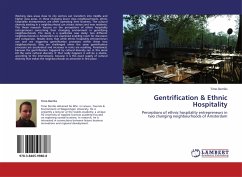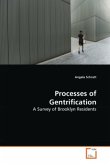Working class areas close to city centres can transform into middle and higher class areas. In these changing lower class neighbourhoods, ethnic hospitality entrepreneurs are often operating their business. The cultural diversity existing in a neighbourhood can attract visitors and new residents. This thesis research focuses on the perceptions of ethnic hospitality entrepreneurs concerning their changing environment in gentrifying neighbourhoods. The study is a qualitative case study: two different neighbourhoods in Amsterdam are examined enabling room for discussion and comparison. Results show that while ethnic hospitality entrepreneurs can and are triggering gentrification processes within these two neighbourhoods, they are challenged when the same gentrification processes are accelerated and increases in rents are resulting. Paradoxical, because the gentrification triggered by cultural diversity can in this sense kill the same cultural diversity. If that really happens it will be a shame, according to the interviewees, because it is this exact supply of cultural diversity that makes the neighbourhoods so attractive in first place.
Bitte wählen Sie Ihr Anliegen aus.
Rechnungen
Retourenschein anfordern
Bestellstatus
Storno








